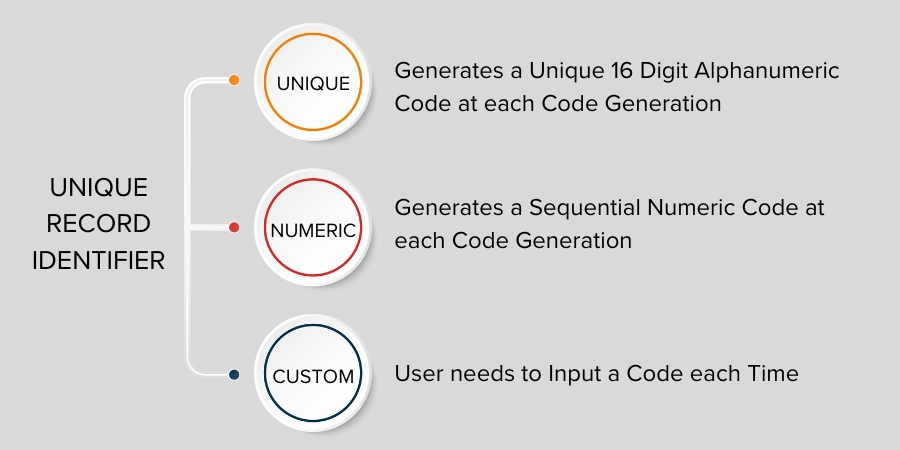
A common requirement in CRM implementations is the need to have readable unique identifiers for your records.
If you look at the fields in every function like Project, Sale or Order, in Batoi CloudSpace, you will see that it contains an ID or Code field that is a unique identifier or code associated with it, which is used for identifying the record uniquely for a single or multiple Organisational Unit(s) within a Tenant Admin (primary user from the customer side).
Let us use one scenario as a context. Let us say you have some customers and you are tracking the payments of those customers in Batoi Apps. The invoices contain an Invoice Number field. For business reasons, you need to have a unique identifier to refer to the invoices. What are the available options?
Manage Unique Record Identifier in Batoi Apps
You can define Unique Record Identifier for every function in Batoi Apps in three ways.
Unique: The system generates a random 16-characters alpha-numeric ID or Code that is unique for each record of the Invoice function. The Invoice Number field behaves as read-only and you cannot edit the field value. The value is set only after you save the record. You can see the value for the field as any other field value in the list page for Invoices or when you view an Invoice.
Numeric: The system generates sequential numeric ID or Code that is unique for each record of the Invoice function. By default, the starting value is 1, and it will increment by 1 for each new record. The Invoice Number field behaves as read-only and you cannot edit the field value. The value is set only after you save the record. You can see the value for the field as any other field value in the list page for Invoices or when you view an Invoice.
Custom: The system allows you to enter a custom value that is unique for each record of the Invoice function. You can edit the value for the Invoice Number field anytime as per your need. The value is set only after you save the record. You can see the value for the field as any other field value in the list page for Invoices or when you view an Invoice.
The default set-up of the record identifiers in Batoi CloudSpace is Unique. The Unique Record Identifier settings as available in the Batoi CloudSpace enables a Tenant Admin to define and to manage how the unique identifier or code for a record of each function will be generated/created.
Unique Record Identifier Generated Based on Your Configuration
If for the Invoices function you define the type as Unique, then each time while creating an Invoice, a unique 16 digit alphanumeric code will be generated for the Invoice Number field for each Invoice. For ex. 42BDVOI6TQ0GFO7Q.
If you define the type as Numeric, then each time while creating an Invoice, a sequential numeric ID or Code will be generated for the Invoice Number field for each Invoice based on the last numeric value that was generated for the Invoice function. For ex. 234.
If you define the type as Custom, then each time while creating an Invoice, you can input a value for the Invoice Number field for each Invoice. For ex. SS/INV/20190915/001. If you input a value that already exists, the system will display an appropriate message.
Best Practices
When deciding on what format you would like to define the unique record identifiers for different functions, there are a number of practical factors to consider.
-
Any change in the configuration to Unique Record Identifier type defined for a function possible through the Unique Record Identifier Settings should be done as per the guidance from your system consultant.
-
Function in Question: For ex. If you define Numeric for the Invoice function, for someone working in the back office to check transactions for an Invoice with Invoice Number 2387, it will work fine. But if you choose Unique, it would be troublesome.
-
Changing the Unique Identifier Type for a Function: You can change the configuration of how the unique identifier or code for a record in a function will be generated/created. If you have created records for a function with a particular type and would like to change the type to another type, it is possible. However, all the previous records created will have the unique identifier code based on the previous configuration and the new records will have unique identifier code generated based on the new configuration. For ex. For the Invoice function, you had defined the type as Numeric and you have an Invoice with Invoice Number as 2387, which is also the last ID or Code that was generated for the Invoice function with the type as Numeric. Now, when you change the unique identifier generation type to Custom, for all the Invoices that you shall be creating, you shall be able to input your custom value in the Invoice Number field. For ex. S/INV/20190915/001. Later, again if you change the type to Numeric, the next Invoice that you create will have the Invoice Number as 2388.


























 Batoi Research Group
Batoi Research Group